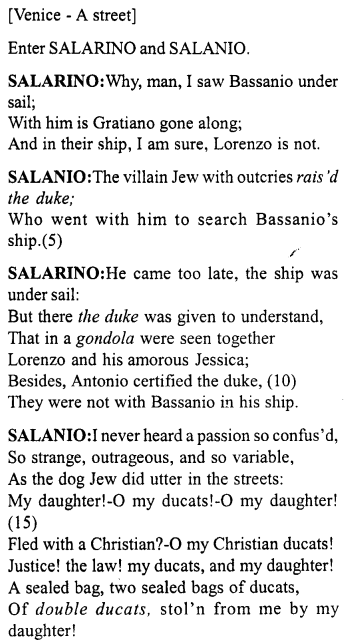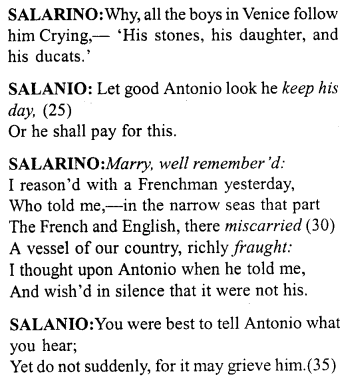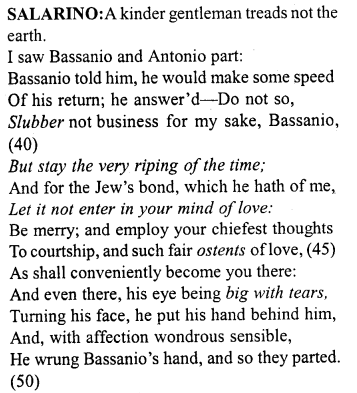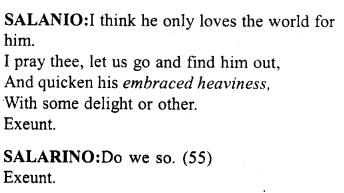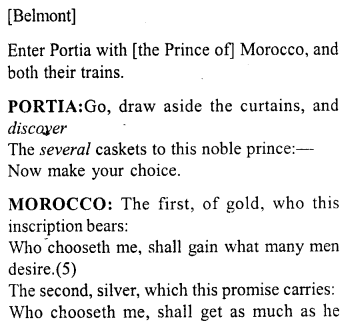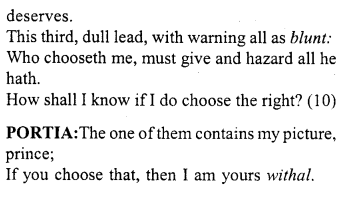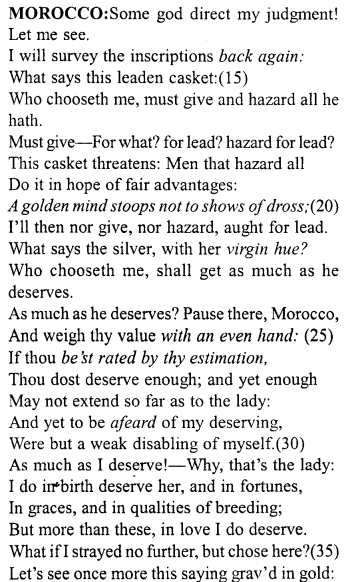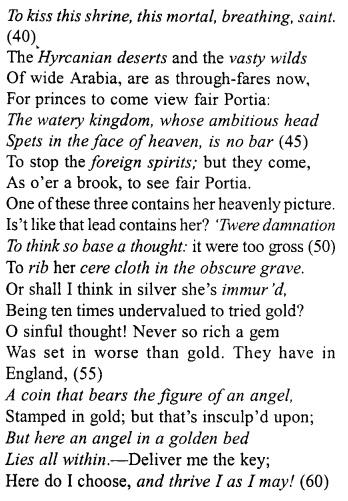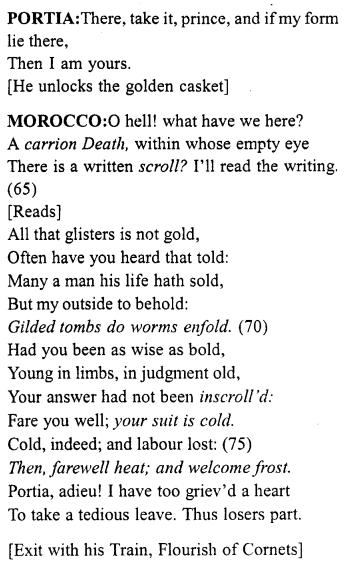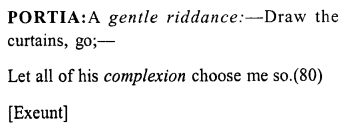Merchant of Venice Workbook Answers Act 2 – Passages with Reference to the Context – ICSE Class 10 & 9 English
ICSE SolutionsSelina ICSE SolutionsML Aggarwal Solutions
EnglishMathsPhysicsChemistryBiology
Passage – 1
(Act II, Sc.I, Lines 1-7)
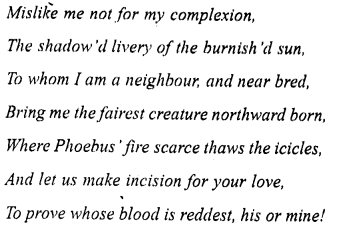
Context : These words are spoken by the Prince of Morocco to Portia when he is about to make his choice of a casket.
Explanation : The Prince of Morocco asks Portia not to dislike him because of his black complexion. As he is a native of a tropical country, his black complexion is due to the excessive heat of the sun. He says that he is willing to stand comparison with the fairest person from a cold, northern country where the sun shines so mildly that it cannot even melt the ice. Let blood be drawn from his body and from the body of a fair-complexioned person and let the redness of their blood be compared to find out which of the two men is healthier and braver.
Passage – 2
(Act II, Sc.I, Lines 24-31)
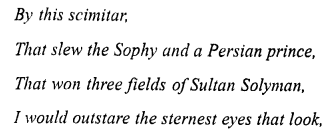
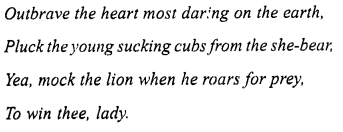
Context : These words, takens from The Merchant of Venice are spoken by the Prince of Morocco to Portia when he us about to make his choice of a casket.
Explanation : The Prince of Morocco swears by his sword that in order to win Portia he would do the most daring thing in the world. With this sword, he says, he killed the Shah of Persia and also a Persian Prince who had thrice defeated Sultan Solyman in battle. He asserts that in order to win Portia he would provoke and overcome the bravest person, snatch away from the she- bear her young, sucking cubs, and even challenge the hungry lion searching for victim.
Passage – 3
(Act II, Sc.I, Lines 31-35)
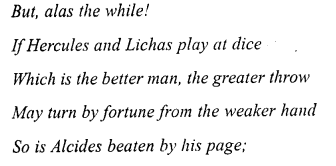
Context : These lines are taken from The Merchant of Venice and form a part of the speech of the Prince of Morocco when he is going to try hjs fortune at the caskets in Portia’s house. He says that in courage he is second to none but that the choice of the right casket is a matter of fate, not of heroism.
Explanation : Hercules in ancient mythology was the strongest of men while Lichas was his servant. Morocco says that if Hercules and Lichas were to play at dice, it is just possible’ that the latter, though inferior to the former in physical strength, might be the winner by the winner by a lucky throw of the dice. Superiority in such a case would be determined by a mere chance. He means that, though he is the bravest of warriors, he might still fail to choose the right casket if accident does not favour him. Morocco feels sad to think that his bravery and heroism can be of no use to him in this lottery.
Passage – 4
(Act II, Sc.II, Lines 150-153)

Context : These words are spoken by Launcelot Gobbo to his blind old father after Bassanio has accepted Launcelot’s suit and given him a job. Launcelot feels very happy and tells his father that he is really a lucky fellow. He looks at the palm and begins to read his fortune.
Explanation : Launcelot says that the lines on his palm indicate that three times he will narrowly escape being drowned but that he will run the serious risk of being married. He concludes his palm-reading by saying that if Fortune be a woman, she is a kind woman indeed, because she is so favourable to him.
Passage – 5
(Act II, Sc.III, Lines 16-19)
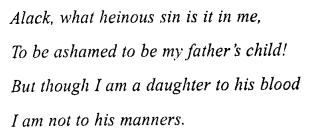
Context : These lines are spoken by Jessica in Act II, Scene III of The Merchant of Venice. They reflect Shylock’s sordid house-keeping. Both his daughter Jessica and his servant. Launcelot are fed up with his harsh treatment and highly suspicious nature. He had made the house a hell for Jessica who is planning to elope with Lorenzo her Christian lover.
Explanation : Jessica gives a letter to Launcelot to be delivered to Lorenzo, apprising him of her intention of eloping with him. She does not like the ways of her father. Although by birth she is his daughter, she is in no ways kindred to his disposition. But she knows that in disliking her father and especially in eloping with a Christian boy against his will, she will be committing a hateful sin. She is, after all, not absolutely heartless.
Passage – 6
(Act II, Sc.V, Lines 29-33)
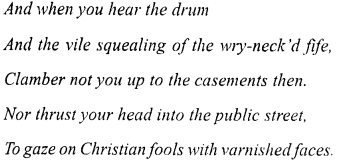
Context : Shylock addresses these words to Jessica in Act II, Scene V of The Merchant of Venice. He has been invited to a feast and he is asking Jessica to guard the house in his absence and shut the windows, if she sees a masque of the Christians in the street.
Explanation : Shylock asks Jessica to note his words. When she hears the sound of the drum and the hateful noise of other musical instruments of the Christians she should not climb to the windows and thrust her head out to listen to them. She should shut all the windows of his house so that no sound of the merry-making of the Christians should pour into it. Thus not to mix with them, Shylock does not even want the sound of the Christian to enter his house.
Passage – 7
(Act II, Sc.V, Lines 46-48)

Context : This comment is made by Shylock, who appreciates the services of Launcelot Gobbo who has come to bid him good-bye after he has taken service under Bassanio. We find him a bit moved at the thought of separation from the servant. .
Explanation : Shylock says that Launcelot is kind enough: but he eats too much, he is as slow as the snail in any useful work and sleeps during the day like the wild cat. So shylock is glad to get rid of him.
Passage – 8
(Act II, Sc.IX, Lines 78-80)

Context : These lines spoken by Portia occur in Act II, Scene IX of The Merchant of Venice. The Prince of Arragon ultimately selects the silver casket and to his utter despair finds a fool’s head in it. But all is to Portia’s relief.
Explanation : Portia feels greatly relieved that the Prince of Arragon fails to choose the right casket and departs with his followers. She says that he has been punished for his arrogance and is glad that fools like he have just intelligence enough to argue wrongly and choose the wrong casket. Arragon is here compared to a foolish insect that has fluttered around a bright light, and been burnt. Portia calls suitors like Arragon “deliberate fools” that is, deliberating fools because they calculated too much and their choice depended not on love but on reasoning which led them astray. She is, of course, relieved and thankful for that.
Passage – 9
(Act II, Sc.VI, Lines 12-19)
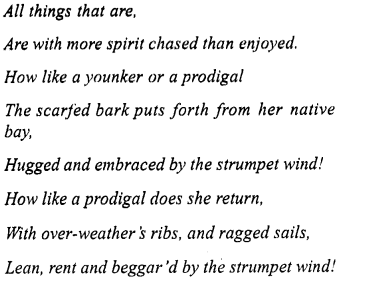
Context : These lines from Act II, Scene VI of The Merchant of Venice bring to light Lorenzo’s companion’s feelings on Lorenzo’s unpunctuality. They comment upon his diminishing ardour for Jessica. Salarino insinuates that his ardour has much cooled down, now that Jessica is his own.
Explanation : Gratiano here gives a full choice of illustration to prove that there is more pleasure in seeking than in actual enjoyment. The novelty of a thing wears out through use. Our pleasure is greater in seeking an object. Therefore, courtship period is more pleasant than the married life.
Passage – 10
(Act II, Sc.IV, Lines 36-39)
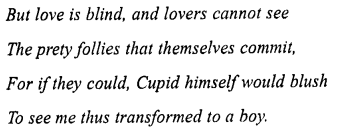
Context : These lines are spoken by Jessica to Lorenzo in Act II, Scene VI of The Merchant of Venice.
Explanation : Jessica feels uneasy about her change of dress. She feels ashamed to come out in a boy’s suit. She, however, feels little sense of comfort that it is a dark night and so Lorenzo cannot notice the change in her. But she adds that if would not have mattered much even if Lorenzo saw her in a boy’s clothes. Lovers, blinded by their passions, do not generally mark the passing follies of each other. So Lorenzo also will not very much mind her change. If, however, Lorenzo were not so love- blind, if he were able to notice her pretty folly, he would have been shocked at Jessica’s transformation, for it was such a change that it would shock even Cupid, the blind god of love.
Passage – 11
(Act II, Scene VI, Lines 41-44)
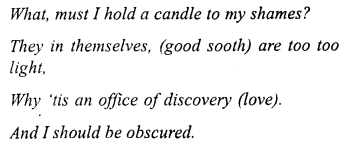
Context : These lines are spoken by Jessica in Act II, Scene VI of The Merchant of Venice. Jessica is secretly running away with Lorenzo. She ought to be kept concealed so that no one should get any trace of her.
Explanation : These lines contain Jessica’s womanly and becoming reply to the suggestion of Lorenzo that she (in the boy’s dress) should be his torch bearer. This was too much for her womanly nature. It is enough that she has put on a boy’s dress; but she could not be expected to display her own shamelessness by being Lorenzo’s torch-bearer. This will simply expose Jessica. Jessica would prefer to remain in darkness rather than hold up a lighted torch which’would be a blow to her modesty.
Passage – 12
(Act II, Sc.VII, Lines 55-59)
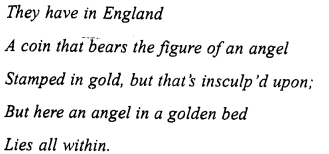
Context : The Prince of Morocco in Act II, Scene VII of The Merchant of Venice argues to himself that he base lead is not suited to have Portia’s portrait. Morocco takes it for granted that he deserves Portia and considers only gold to be equal to his rank and appropriate to Portia’s qualities. The image he thinks worthy of Portia leads him astray.
Explanation : The Prince of Morocco in these lines argues to himself that the base lead cannot contain the portrait of saint-like. Portia and silver which is ten times inferior to gold, cannot also contain Portia, a rich gem like her is worthy of golden casket only. There he thinks that only golden casket which bears the inscription. “What many desire” contains her portrait. He remembers the English coin, which people use, bears the image of an angel, Portia is no less than an angel. Therefore, she must be contained in the golden casket, entirely hidden from view.
Passage – 13
(Act II, Sc.VIII, Lines 15-17)

Context : These lines are taken from Act II Scene VIII of The merchant of Venice. Salanio tells Salarino about Shylock’s storm in his mind on finding his daughter having eloped with Lorenzo.
Explanation : In these lines Shylock laments about his daughter who has eloped with her lover. In his outcry Shylock seems greatly upset by the loss of both—his daughter and ducats, with perhaps the greater weight on the latter. In utter despair, he moves about the streets, crying about his loss. The worst part of it is that she has run away with a Christian.
Passage – 14
(Act II, Sc.IX, Lines 46-49)
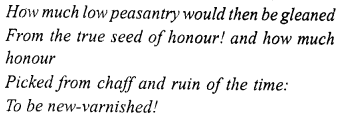
Context : These lines are spoken by the Prince of Arragon in Act II, Scene IX of The Merchant of Venice. Arragon is examining the caskets and on the silver one he reads the inscription, “Who chooses me shall get as much as he deserves.” He argues over it that people should certainly get what they deserve. In life so many people attain dignities without merit. In these lines he expresses this injustice rampant in the world.
Explanation : In these lines which are pregnant with dramatic irony the Prince of Arragon deplores the practice of the Elizabethan Age to award prizes and distinctions not to persons of merit, though of humble origin; but always to persons of rank even though undeserving. If merit were the only criterion, the humblest would occupy the most eminent positions and the men, in them would be reduced to nothing.- People should get what they deserve and as Arragon thinks he deserves Portia, he chooses the silver casket.
Passage – 15
(Act II, Sc.VI, Lines 8-13)


Context : These lines are taken from The Merchant of Venice. Gratiano and Salarino are waiting for Lorenzo who was to come at a certain hour but is late. Gratiano explains this delay by saying that in all matters one is full of enthusiasm only till the time of fulfillment and that one’s desire cools down afterwards.
Explanation : One may be hungry like a hawk when sitting to meal but after the meal one feels fully satisfied. A horse, fresh from the stable, will show fire and energy and speed but during the return journey he shows a complete lack of willingness to run fast. A man shows more enthusiasm in the pursuit of a pleasure than in its enjoyment.
Passage – 16
(Act II, Sc.VI, Lines 14-19)
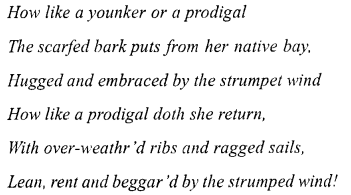
Context : These lines are taken from Gratiano’s speech to Salarino in The Merchant of Venice. The^two friends are waiting for Lorenzo who has to come to this place where Jessica will join him. Lorenzo is late. Gratiano remarks that a man feels more pleasure in the pursuit of an object than in its achievement. Gratiano illustrates his statement with the following example.
Explanation : A ship leaves its native harbour with flags and other decorations. The wind seems very favourable and plays with that sails of the ship. In other words, the sails are filled with the wind which drives the ship forward. The same ship, on its return, has a weather beaten appearance because, during its voyage the faithless wind played it false and damaged its sails as well as its framework. This ship may be compared to a prodigal (spendthrift) who leaves home and returns to it, after a period of dissipation, in a state of financial and moral bankruptcy.
Passage – 17
(Act II, Scene IX, Lines 25-33)
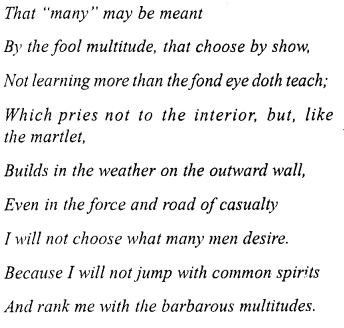
Context : These words are spoken by the Prince of Arragon in The Merchant of Venice When he reads the inscription on the gold casket while making his choice. The inscription reads: ‘‘Who chooseth me shall gain what many me desire.”
Explanation : The Prince of Arragon argues that this inscription should not tempt him. The word “many” in the inscription means the common people who include a large number of fools. These fools are misled by external appearances. To judge things by their external appearance is as foolish as for a swallow to build a nest on some outward wall exposed to all the storms, directly in the path of accidents. For this reason, he says, he would not like to class himself with the common people by choosing the gold casket.
Passage – 18
(Act II, Sc. IX, Lines 41-49)
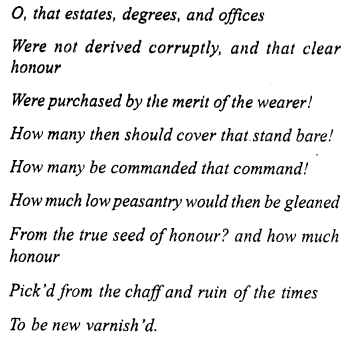
Context : These lines are taken from The Merchant of Venice and are part of the speech of the Prince of Arragon when he is examining the inscriptions on the various caskets.
Explanation : He says that high offices, titles and positions of honour should not be secured by dishonest means. He wants that merit alone should be the criterion for such rewards. If merit were the sole test, many of those who at present enjoy high positions and prosperity would be reduced to insignificance; and many who are powerful would be forced into subordinate positions. A.proper distinction between worthless people and honourable persons would then be made. In that case many who are disregarded and ignored at present would rise to high place.
For More Resources
